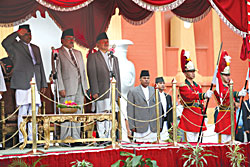 KIRAN PANDAY |
We do not do justice to Nepal's emergence as a country 240 years ago with retroactive political correctness. Nepal was amalgamated with military conquest at a time when regional powers were in ascendance. The Chinese emperor had come to the aid of an emerging power in Tibet, and by 1797 the British East India Company had already taken control of Burma, Bengal and Bihar, and was advancing on the Oudh.
What would Nepal have been like if there had been no expansion? Would Nepal even exist today? What would be the fate of the principalities that were unified? In 1768, how would they have been able to stop the belligerent British to the south, the Chinese to the north and Russia beyond?
The nation state that did emerge in Nepal after the conquest established certain pillars of nationalism not just through political unification, but based on culture, language and religion. Even though Prithbi Narayan Shah was aware of Nepal's diversity, he tried to construct symbols of unity. In hindsight, there is no question that this artificial nationalism ignored diversity but it was needed at that time to cement the young nation.
We have tried since the 2006 uprising to demolish these edifices of our nationalism. There are legitimate reasons to question these symbols because they were unjust, they fostered discrimination, they centralised political and economic power and excluded a large section of the population from decision-making.
Just like the ex-soviet Union, Czechoslovakia and ex-Yugoslavia disintegrated after the removal of a central unifying power, Nepal has also seen a deterioration of inter-ethnic relations, geographical friction between geographical regions, and the beginnings of linguistic, religious and caste friction.
There are new boundaries being drawn up between the Pahad, Madhes, Tarai and Himal. The politics of identity is churning away and undermining our survival as a multi-ethnic, multi-religious, multi-cultural nation state. We have abandoned the old, but there are no new shared bonds to help us stay together. Nepalis live in Nepal, but have questions about their own Nepaliness.
Political parties, ethnic groups and so-called experts have been putting forth demands for self-determination and for ethnic federalism. Their worry is not about the existence of the nation state, but about their individual identities. This is like arguing over the windows even before the house is planned.
Air-brushing our shared history has brought out a cacophony of competing demands for identity which has drowned out the need for a shared identity for our new republic. How can we move ahead on the road to economic progress, equity, justice and self-esteem without a shared national consciousness, shared identity, shared symbols of Nepali nationalism?
These issues are now going to come to the fore in the discussions over federalism, of what kind and their boundaries. The builders of the New Nepal must now think about whether we will be here or not, where we will be if there is no Nepal. If we don't replace the old symbols with new ones, it is clear that neither the house nor the windows will ever be built.
Dr Narayan Khadka is a NC member of the Constituent Assembly from Udaypur.



